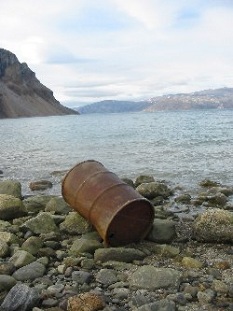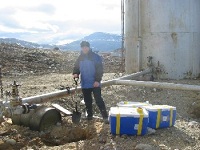Diesel Contaminated Soil at Ekalugad Fiord: The Landfarming Option
A field trip was instigated in the summer of 2005 to investigate the potential for landfarming the diesel contaminated soil at Ekalugad Fiord. Ekalugad Fiord is situated on the east coast of Baffin Island, Nunavut, and was the site of an intermediate DEW Line station, FOX-C. Diesel contaminated soils were collected in 6 coolers and transported to the Analytical Services Unit laboratories at Queen's University in Kingston, Ontario.
Laboratory studies were set up at three different temperatures: 5°C, 8°C and 18°C. The experimental design of the reactors attempted to simulate a landfarm and, in particular, looked at the contributions of aeration and bioremediation. The addition of fertilizer and the frequency of rotation were varied, resulting in five different soil treatments at the three temperatures. As was expected, temperature was an important factor with the reactors at 18°C remediating more diesel than the 8°C or the 5°C. However, at the colder temperatures the soils were successfully remediated with a rotation frequency of 4 days and the addition of fertilizer. At 5°C in particular, aeration improved results and clear evidence of bioremediation was observed.


The data from the laboratory experiments indicate that landfarming at Ekalugad Fiord does have the potential to successfully remediate the diesel contaminated soils. It is recommended that the landfarm be set up in the warmest location possible, at low elevation and south facing. Fertilizer should be added and the landfarm tilled daily.
Although the laboratory experiments indicate that the TPH concentrations of the soil can be substantially reduced in approximately 100 days, field conditions such as the proximity of a glacier at the northern site are expected to reduce the rate of TPH remediation. Given the potential for washout of the soils, the landfarm should only proceed if an appropriate location can be found.